Treasurer of Australia
Australian government minister in charge of economic policy From Wikipedia, the free encyclopedia
The Treasurer of Australia, also known as the Federal Treasurer or more simply the Treasurer, is the minister of state of the Commonwealth of Australia charged with overseeing government revenue collection, federal expenditure and economic policy as the head of the Department of the Treasury. The current treasurer is Jim Chalmers, who was selected by Prime Minister Anthony Albanese in May 2022 following the 2022 Australian federal election.
| Treasurer of Australia | |
|---|---|
 | |
 | |
| Department of the Treasury | |
| Style | The Honourable |
| Member of | Cabinet Federal Executive Council National Security Committee |
| Seat | Canberra, ACT |
| Appointer | Governor-General on the advice of the prime minister |
| Term length | At the Governor-General's pleasure |
| Formation | 1 January 1901 |
| First holder | Sir George Turner |
| Website | ministers |
The Treasurer implements ministerial powers through the Department of the Treasury and a range of other government agencies. According to constitutional convention, the Treasurer is always a member of the Parliament of Australia with a seat in the House of Representatives. The office is generally seen as equivalent to the Chancellor of the Exchequer in the United Kingdom or the Secretary of the Treasury in the United States or, in some other countries, the finance minister. It is one of only four ministerial positions (along with prime minister, Minister for Defence and Attorney-General) that have existed since Federation.[1]

Responsibilities and duties
Summarize
Perspective
The Treasurer is the minister in charge of government revenue and expenditure. The Treasurer oversees economic policy: fiscal policy is within the Treasurer's direct responsibility, while monetary policy is implemented by the politically independent Reserve Bank of Australia, the head of which is appointed by the Treasurer. The Treasurer also oversees financial regulation. Each year in May, the Treasurer presents the Federal Budget to the Parliament.
The Prime Minister and Treasurer are traditionally members of the House, but the constitution does not have such a requirement.[2] The tradition is due to the fact that under the constitution, appropriation bills have to originate from the House, and if the Treasurer is a senator, they would not be able to introduce the bills. This would also mean another minister would need to give the nationally televised budget speech and introduce the bills.[3] While no Federal Treasurer has been a member of the Senate, New South Wales, Victoria, Tasmania and South Australia had state Treasurers who had served as members of the Legislative Councils, the states' upper houses.[4]
Unlike the scenario in which a treasurer who is a senator cannot present the budget in the House of Representatives, state treasurers who have been members of upper houses have delivered their budgets in the respective lower houses.
The treasurer is a very senior government post, usually ranking second or third in Cabinet. Historically, many treasurers have previously, concurrently or subsequently served as prime minister or deputy prime minister; two subsequently served as Governor-General. Service as treasurer is seen as an important (though not essential) qualification for serving as prime minister: to date, six treasurers have gone on to be prime minister.
Paul Keating and Wayne Swan are currently the only two to have been named "Euromoney Finance Minister of the Year" by Euromoney magazine.[5]
Since 1958, Treasurers in Coalition governments have often but not always been the deputy leader of the Liberal Party. In contrast, only four Labor Treasurers have also been the deputy leader of the Labor Party.
Related ministerial positions
Along with the Treasurer, other ministers have responsibility for the Department of the Treasury. The Treasurer together with these other ministers are known as the "Treasury Ministers". At present, the Treasury Minister positions are:[6]
The work of the Department of Finance is closely related to the work of the Department of the Treasury, with the former responsible for budget formation and operational management of government finances. The ministers who have responsibility for the Department of Finance are:[7]
Treasury portfolio
Summarize
Perspective
Eleven organizations nominally fall under the auspices of the Australian Treasurer. They entail the provision of policy advice to portfolio ministers; effective government spending and taxation arrangements; and well-functioning markets.
- The Department of the Treasury creates policies and reports for four output groups. These groups are macroeconomic, fiscal, revenue and markets:
- Macroeconomic reports include: domestic economic policy advice and forecasting and international economic policy advice and assessment.
- Fiscal reports include: budget policy advice and coordination; Commonwealth-State financial policy advice; and industry, environment and social policy advice.
- Revenue reports include: taxation and income support policy advice.
- Markets reports include: foreign investment policy advice and administration; financial corporate governance policy advice; competition and consumer policy advice; and actuarial services. In addition, the Royal Australian Mint is responsible for producing Australia's circulating currency.
- The Australian Bureau of Statistics is Australia's official statistical agency. Its reports are created for decision-making, research and discussion within governments and the community. It principally relates to the production of economic, population and social statistics.
- The Australian Office of Financial Management manages the Commonwealth's net debt portfolio. Its reports on debt management directed at ensuring that the Commonwealth net debt portfolio is managed, subject to the government's policies and risk references.
- The National Competition Council is an independent advisory body for all Australian governments involved in implementing the National Competition Policy. Outputs include: advice provided to governments on competition policy and infrastructure access issues and accessible public information on competition policy.
- The Productivity Commission is an advisory body on microeconomics policy that contributes to public understanding.
- The Australian Taxation Office outputs are directed at systems that support and fund services for Australians and give effect to social and economic policy through the tax, superannuation, excise and other related systems. Outputs include: design and build administrative systems; management of revenue collection and transfers; compliance assurance; and regulation of superannuation funds compliance with retirement income standards. The Inspector-General of Taxation is an independent statutory office to review systemic tax administration issues and to report to the Government with recommendations for improving tax administration for the benefit of taxpayers.
- The Australian Competition and Consumer Commission is a regulation agency mandated for consumer rights by industry regulation and price monitoring.
- The Australian Prudential Regulation Authority is the financial supervisor responsible for prudentially regulating the banking, other deposit-taking, insurance and superannuation industries.
- The Australian Securities and Investments Commission (ASIC) is the independent government body that enforces and administers the Corporations Law and Consumer Protection Law for investments, life and general insurance, and superannuation and banking (except lending). Outputs include: policy, enforcement and guidance about ASIC-administered laws; information on companies and corporate activity; and monitoring and licensing of participants.
- The Corporations and Markets Advisory Committee (CAMAC) creates reports directed at participation of investors and consumers. It makes recommendations to the responsible Minister on the Corporations Law, and produces and publishes an annual report along with other discussion papers and reports.
List of treasurers
Summarize
Perspective
The following individuals have been appointed as Treasurer of Australia:[6]
| Order | Treasurer | Portrait | Party | Prime Minister | Term start | Term end | Term in office | |
|---|---|---|---|---|---|---|---|---|
| 1 | Sir George Turner |  |
Protectionist | Barton | 1 January 1901 | 27 April 1904 | 3 years, 117 days | |
| Deakin | ||||||||
| 2 | Chris Watson1 |  |
Labour | Watson | 27 April 1904 | 17 August 1904 | 112 days | |
| (1) | Sir George Turner |  |
Protectionist | Reid | 17 August 1904 | 4 July 1905 | 321 days | |
| 3 | Sir John Forrest |  |
Deakin | 4 July 1905 | 30 July 1907 | 2 years, 26 days | ||
| 4 | Sir William Lyne |  |
30 July 1907 | 13 November 1908 | 1 year, 106 days | |||
| 5 | Andrew Fisher1 |  |
Labour | Fisher | 13 November 1908 | 2 June 1909 | 201 days | |
| (3) | Sir John Forrest |  |
Commonwealth Liberal | Deakin | 2 June 1909 | 29 April 1910 | 331 days | |
| (5) | Andrew Fisher1 |  |
Labour | Fisher | 29 April 1910 | 24 June 1913 | 3 years, 56 days | |
| (3) | Sir John Forrest |  |
Commonwealth Liberal | Cook | 24 June 1913 | 17 September 1914 | 1 year, 85 days | |
| (5) | Andrew Fisher1 |  |
Labor | Fisher | 17 September 1914 | 27 October 1915 | 1 year, 40 days | |
| 6 | William Higgs | 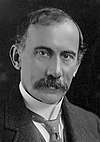 |
Hughes | 27 October 1915 | 14 November 1916 | 1 year, 18 days | ||
| 7 | Alexander Poynton |  |
National Labor | 14 November 1916 | 17 February 1917 | 95 days | ||
| (3) | Sir John Forrest |  |
Nationalist | 17 February 1917 | 27 March 1918 | 1 year, 38 days | ||
| 8 | William Watt |  |
27 March 1918 | 28 July 1920 | 2 years, 123 days | |||
| 9 | Sir Joseph Cook |  |
28 July 1920 | 21 December 1921 | 1 year, 146 days | |||
| 10 | Stanley Bruce |  |
21 December 1921 | 9 February 1923 | 1 year, 50 days | |||
| 11 | Earle Page | 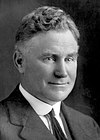 |
Country | Bruce | 9 February 1923 | 22 October 1929 | 6 years, 255 days | |
| 12 | Ted Theodore |  |
Labor | Scullin | 22 October 1929 | 9 July 1930 | 260 days | |
| 13 | James Scullin1 |  |
9 July 1930 | 29 January 1931 | 204 days | |||
| (12) | Ted Theodore |  |
29 January 1931 | 6 January 1932 | 342 days | |||
| 14 | Joseph Lyons1 |  |
United Australia | Lyons | 6 January 1932 | 3 October 1935 | 3 years, 270 days | |
| 15 | Richard Casey |  |
3 October 1935 | 8 April 1939 | 3 years, 187 days | |||
| Page | 7 April 1939 | 26 April 1939 | ||||||
| 16 | Robert Menzies1 |  |
Menzies | 26 April 1939 | 14 March 1940 | 323 days | ||
| 17 | Percy Spender |  |
14 March 1940 | 28 October 1940 | 228 days | |||
| 18 | Arthur Fadden1 |  |
Country | 28 October 1940 | 30 August 1941 | 344 days | ||
| Fadden | 29 August 1941 | 7 October 1941 | ||||||
| 19 | Ben Chifley1 | 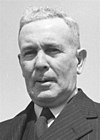 |
Labor | Curtin | 7 October 1941 | 6 July 1945 | 8 years, 73 days | |
| Forde | 6 July 1945 | 13 July 1945 | ||||||
| Chifley | 13 July 1945 | 19 December 1949 | ||||||
| (18) | Sir Arthur Fadden | 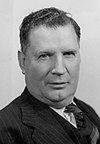 |
Country | Menzies | 19 December 1949 | 10 December 1958 | 8 years, 356 days | |
| 20 | Harold Holt |  |
Liberal | 10 December 1958 | 26 January 1966 | 7 years, 47 days | ||
| 21 | William McMahon |  |
Holt | 26 January 1966 | 18 December 1967 | 3 years, 290 days | ||
| McEwen | 19 December 1967 | 10 January 1968 | ||||||
| Gorton | 10 January 1968 | 12 November 1969 | ||||||
| 22 | Les Bury |  |
12 November 1969 | 10 March 1971 | 1 year, 130 days | |||
| McMahon | 10 March 1971 | 22 March 1971 | ||||||
| 23 | Billy Snedden |  |
22 March 1971 | 5 December 1972 | 1 year, 258 days | |||
| 24 | Gough Whitlam1 |  |
Labor | Whitlam | 5 December 1972 | 19 December 1972 | 14 days | |
| 25 | Frank Crean |  |
19 December 1972 | 11 December 1974 | 1 year, 357 days | |||
| 26 | Jim Cairns |  |
11 December 1974 | 6 June 1975 | 177 days | |||
| 27 | Bill Hayden |  |
6 June 1975 | 11 November 1975 | 158 days | |||
| 28 | Phillip Lynch |  |
Liberal | Fraser | 11 November 1975 | 19 November 1977 | 2 years, 8 days | |
| 29 | John Howard |  |
19 November 1977 | 11 March 1983 | 5 years, 112 days | |||
| 30 | Paul Keating | 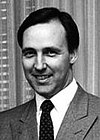 |
Labor | Hawke | 11 March 1983 | 3 June 1991 | 8 years, 84 days | |
| 31 | Bob Hawke1 | 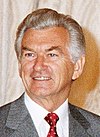 |
3 June 1991 | 4 June 1991 | 1 day | |||
| 32 | John Kerin | 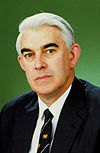 |
4 June 1991 | 9 December 1991 | 189 days | |||
| 33 | Ralph Willis | 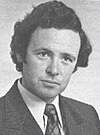 |
9 December 1991 | 20 December 1991 | 18 days | |||
| Keating | 20 December 1991 | 27 December 1991 | ||||||
| 34 | John Dawkins | 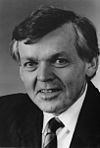 |
27 December 1991 | 23 December 1993 | 1 year, 361 days | |||
| (33) | Ralph Willis |  |
23 December 1993 | 11 March 1996 | 2 years, 79 days | |||
| 35 | Peter Costello |  |
Liberal | Howard | 11 March 1996 | 3 December 2007 | 11 years, 267 days | |
| 36 | Wayne Swan |  |
Labor | Rudd | 3 December 2007 | 24 June 2010 | 5 years, 206 days | |
| Gillard | 24 June 2010 | 27 June 2013 | ||||||
| 37 | Chris Bowen |  |
Rudd | 27 June 2013 | 18 September 2013 | 83 days | ||
| 38 | Joe Hockey |  |
Liberal | Abbott | 18 September 2013 | 15 September 2015 | 2 years, 3 days | |
| Turnbull | 15 September 2015 | 21 September 2015 | ||||||
| 39 | Scott Morrison | 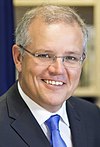 |
21 September 2015 | 24 August 2018 | 2 years, 337 days | |||
| 40 | Josh Frydenberg2 |  |
Morrison | 24 August 2018 | 23 May 2022 | 3 years, 272 days | ||
| (39) | Scott Morrison1 2 |  |
6 May 2021 | 1 year, 17 days | ||||
| 41 | Jim Chalmers |  |
Labor | Albanese | 23 May 2022 | Incumbent | 2 years, 278 days | |
- 1 Treasurers Watson, Fisher, Scullin, Lyons, Fadden, Menzies, Chifley, Whitlam, Hawke and Morrison were also Prime Minister during some or all of their period as Treasurer.
- 2 Morrison was appointed as Treasurer by the Governor-General on Morrison's advice in May 2021, with both Morrison and Frydenberg holding the position of Treasurer until May 2022. However, the appointment of Morrison was not made public until August 2022.
Living former treasurers
As of 25 February 2025, there are ten living former treasurers of Australia, the oldest being Ralph Willis (served 1991, 1993−1996, born 1938). The most recent treasurer to die was Bill Hayden (served 1975) on 21 October 2023. The most recently serving treasurer to die was John Kerin (served 1991) on 29 March 2023.[8]
| Treasurer | Term(s) as treasurer | Date of birth (and age) |
|---|---|---|
| Ralph Willis | 1991, 1993–1996 | 14 April 1938 |
| John Howard | 1977–1983 | 26 July 1939 |
| Paul Keating | 1983–1991 | 18 January 1944 |
| John Dawkins | 1991–1993 | 2 March 1947 |
| Wayne Swan | 2007–2013 | 30 June 1954 |
| Peter Costello | 1996–2007 | 14 August 1957 |
| Joe Hockey | 2013–2015 | 2 August 1965 |
| Scott Morrison | 2015–2018, 2021–2022 | 13 May 1968 |
| Josh Frydenberg | 2018–2022 | 17 July 1971 |
| Chris Bowen | 2013 | 18 January 1973 |
See also
References
External links
Wikiwand - on
Seamless Wikipedia browsing. On steroids.

